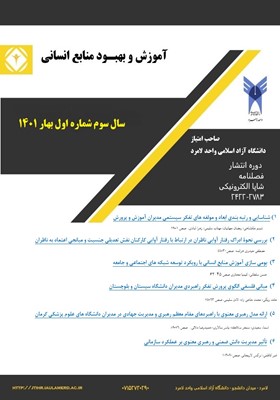مبانی فلسفی الگوی پرورش تفکر راهبردی مدیران دانشگاه سیستان و بلوچستان
محورهای موضوعی : مدیریت منابع انسانیحامد ریگی 1 , محمد حاجی زاد 2 * , لادن سلیمی 3
1 - دانشجوی دکتری فلسفه تعلیم و تربیت، دانشگاه آزاد اسلامی، واحد ساری، ساری، ایران.
2 - گروه علوم تربیتی، واحد نکا، دانشگاه آزاد اسلامی، نکا، ایران
3 - گروه علوم تربیتی، واحد ساری، دانشگاه آزاد اسلامی، ساری، ایران
کلید واژه: تفکر راهبردی, پرورش تفکر, تصمیم گیری هوشمندانه,
چکیده مقاله :
پژوهش حاضر به بررسی مبانی فلسفی الگوی پرورش تفکر راهبردی دانشگاه سیستان و بلوچستان میپردازد. این پژوهش از نظر هدف، کاربردی و از لحاظ ماهیت گردآوری اطلاعات، توصیفی از نوع پیمایشی است که به روش آمیخته (کیفی و کمّی) انجام شد. جامعه آماری در بخش کیفی شامل 14 نفر از اساتید خبره و برجسته با مرتبه علمی دانشیار و استاد شاغل در دانشگاه سیستان و بلوچستان میباشد. که با تکنیک گلوله برفی بصورت هدفمند انتخاب شدند؛ و در بخش کمّی جامعه آماری شامل 369 نفر از اعضای هیئتعلمی 12 دانشکده دانشگاه سیستان و بلوچستان با مرتبه علمی مربی، استادیار، دانشیار و استاد میباشند که بر اساس جدول کرجسی و مورگان به تعداد 188 نفر با روش نمونهگیری تصادفی طبقهای بر حسب دانشکده و مرتبه علمی انتخاب گردیدند. ابزار جمعآوری اطلاعات در بخش کیفی مصاحبه نیمه ساختاری و در بخش کمّی پرسشنامه محقق ساخته بود. یافته-های نشان داد مبانی فلسفی الگوی پرورش تفکر راهبردی مدیران دانشگاه سیستان و بلوچستان شامل 18 مؤلفه اصلی نگرش فلسفی، نگرش سیستمی و مفهومی، دوراندیشی و آینده نگری، ویژگیهای رفتاری، عوامل انگیزشی، عوامل ساختاری، فرهنگ دانشگاهی، یادگیری سازمانی، تفکر انتقادی، محیط پیرامونی، محیط سازمان، تعارض سازمانی، تصمیمگیری هوشمندانه، اصلاح ساختارهای سازمانی، استعدادیابی و شایسته پروری، طراحی استراتژی-های خلاقانه، پرورش مدیران استراتژیست، ایجاد مزیت رقابتی میباشد. نتایج پژوهش نشان داد که مدیران دانشگاهی، باید دارای درکی کلی از محیط دانشگاه باشند، آنها باید خلاق بوده و دارای چشم اندازی برای آینده سازمان باشند.
This research is applied in terms of purpose and in terms of the nature of data collection, it is a descriptive survey that uses a mixed-methods (qualitative and quantitative) approach. The statistical population in the qualitative phase includes 14 expert faculty members with the scientific rank of associate professor and full professor working at the University of Sistan and Baluchestan. The participants were purposefully selected using snowball technique. In the quantitative phase, the statistical population involved 369 faculty members from 12 faculties of Sistan and Baluchestan University with the academic rank of instructor, assistant professor, associate professor, and full professor. According to Krejcie and Morgan table, 188 faculty members were selected based on their faculty and academic rank using random sampling method. The data collection tool was semi-structured interview in the qualitative phase and a researcher-made questionnaire in the quantitative phase. According to the results, the philosophical foundations of the strategic thinking model of managers at Sistan and Baluchestan University included the following 18 main components: philosophical attitude, systemic and conceptual attitude, foresight, behavioral characteristics, structural factors, academic culture, organizational learning, critical thinking, surrounding environment, organizational conflict, intelligent decision making, organizational structure reform, talent and competency identification, creative strategy design, training of strategic managers, and creating competitive advantage. The results showed that university administrators should have a general understanding of the university environment, and they should be creative and have vision for the future of the organization.
_||_

